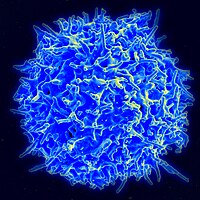
Photo from wikipedia
Adult T-cell leukemia/lymphoma (ATL) is a malignancy of mature T lymphocytes induced by human T-cell leukemia virus-1 and has a poor outcome. New molecular targets for the prevention and treatment… Click to show full abstract
Adult T-cell leukemia/lymphoma (ATL) is a malignancy of mature T lymphocytes induced by human T-cell leukemia virus-1 and has a poor outcome. New molecular targets for the prevention and treatment of ATL are needed urgently. We previously reported high expression of Sirtuin 1, a nicotinamide adenine dinucleotide (NAD+)-dependent histone/protein deacetylase, in primary acute-type ATL cells. NAD+ biosynthesis via nicotinamide phosphoribosyltransferase (NAMPT) modulates Sirtuin 1 activity. Here, we examined the expression and effects of inhibiting NAMPT, a rate-limiting enzyme in NAD+ biosynthesis, in ATL cells. We found that peripheral blood mononuclear cells from patients with acute-type ATL expressed significantly higher levels of NAMPT protein than cells from healthy subjects. FK866, a NAMPT inhibitor, induced apoptosis of freshly isolated ATL cells ex vivo and HTLV-1-infected T-cell lines in vitro, which was accompanied by activation of caspases, DNA fragmentation, and disruption of mitochondrial transmembrane potential. However, a pan-caspase inhibitor failed to prevent this FK866-induced cell death, while FK866 increased the caspase-independent cell death mediator endonuclease G. Intriguingly, FK866 also activated autophagy, as demonstrated by increases in protein levels of autophagosome marker LC3-II. Thus, FK866 simultaneously activated apoptosis and autophagy. Finally, FK866 treatment markedly decreased the growth of human ATL tumor xenografts in immunodeficient mice. We showed that NAMPT is highly expressed in primary ATL cells ex vivo, and that FK866 induces autophagy and caspase-dependent and -independent cell death pathways in vitro and has an anti-tumor activity in vivo. These results suggest a novel therapeutic strategy for patients with this fatal disease.
Journal Title: European journal of pharmacology
Year Published: 2019
Link to full text (if available)
Share on Social Media: Sign Up to like & get
recommendations!